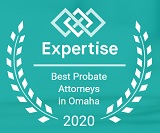Omaha Probate Counsel
Assistance for People Going Through Probate
If you are dealing with the estate of a loved one, Bottlinger Law L.L.C. can help you navigate the sometimes-complicated probate process. We can help with probate administration, including things like giving notices to creditors, disputing their claims, or helping administer assets and seeing to their distribution.
Many people die without having a will, and we can help whether there’s a will or not. Bottlinger Law L.L.C. can assist if you require probate litigation, such as in a dispute between beneficiaries. If you are going through probate and need some assistance, we are here to help make the process easier on you and your loved ones. Call (402) 505-8234.
What Is Probate?
Probate refers to the official process in which an estate is settled - legally divided or passed on - through court proceedings. One person, appointed by the court and nominated by the deceased person's will or often a close family member if there is no will, is named as executor or personal representative. This person has legal authority to handle all of the assets of the person who has died. Probate acts as a way to avoid fraud after a person's death; to freeze the deceased's assets and make sure they are handled properly.
Do I Need a Lawyer in Probate?
While that depends on the exact nature of your situation, in general, it is best to have a lawyer help you with a probate proceeding. Even in a straightforward probate proceeding, an experienced estate lawyer can help you with questions and make sure everything is done properly. You might not need to see an attorney every day during the process, but the advice and knowledge one can provide is valuable and worth having.
What Are Ways to Avoid Probate?
 There are a few different ways to avoid probate, usually set in motion prior to someone's death (though some situations after death can also avoid probate). These include:
There are a few different ways to avoid probate, usually set in motion prior to someone's death (though some situations after death can also avoid probate). These include:
- Living Trust: If assets are handled through a living trust, then the estate contained within the trust is handled without probate. This is one of the best ways to avoid probate ahead of time, especially when a knowledgeable estate lawyer helps create the trust.
- Joint Tenancy: If the title of an asset is in the name of joint tenants with right of survivorship, then the surviving tenant becomes owner after the other person's death. There is often no need for probate of the jointly held asset in this situation (though the surviving joint tenant may still need a lawyer’s help resolving issues related to inheritance tax).
- Community Property with Right of Survivorship: Property owned in marriage can pass to a surviving spouse without any probate, but you may still need a probate to transfer title if, for example, the deceased spouse owns title as a Tenant in Common (instead of as a Joint Tenant).
- Beneficiary Designations: Life insurance policies and retirement accounts typically have named beneficiaries. The beneficiaries are generally entitled to assets from the policy or account without going through probate after the death of a policy or account owner.
- Simple Affidavit: In some cases, when property is valued at less than $50,000, then inheritors can sign an affidavit under oath stating they are entitled to the assets.
The Probate Process: Informal Probate
Informal probate is pretty simple and works when the heirs or beneficiaries of a deceased person get along and are not fighting over assets. The personal representative or executor administers the estate and handles the following:
- Sending formal notice to heirs, beneficiaries, and creditors
- Publishing a notice in a local newspaper
- Preparing an inventory and appraisal of the estate's assets
- Keeping the property safe
- Distributing the property as necessary
Once all of this is done, the personal representative files a final accounting and closing statement with the court, finishing the process.
The Probate Process: Formal Probate
When there are conflicts regarding whether the deceased party left a valid will, a formal probate is often necessary. Parties can also request a formal determination that there was no will. In a formal probate, a judge must approve some actions taken by the executor of the estate to ensure everything is handled properly. Court rulings may also be necessary when there are disputes over property, interpretation of the will, and amounts due to creditors. This type of probate usually involves some assets that are contested, while others are divided more peaceably.
The Probate Process: Supervised Formal Probate
If conflict between heirs in a will becomes even more heated, then a supervised formal probate proceeding may be necessary. At this point, the court has to approve the distribution of all property, not just specific assets that are contested. This can include the payment of debts, division of land and financial holdings, and other complicated factors. This type of probate usually takes a long, difficult time, but it is increasingly rare as estate planning services can avoid the need for it completely.
Additional Information
Bottlinger Law
Consultation Form
Our legal team is ready to help. Please fill out the form below to set up a free consultation with the Bottlinger Law team.
Membership in this group is restricted only to attorneys who have won multi-millions dollar verdicts for their clients.
Jason Bottlinger has been named one of the Top 40 Lawyers under the age of 40 in the state by The National Trial Lawyers organization.
Our firm has a perfect A+ from the Better Business Bureau of Nebraska, which grades based on 13 different factors.